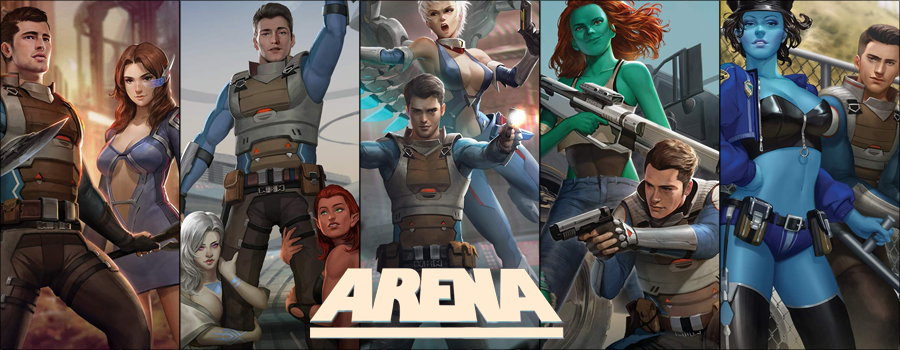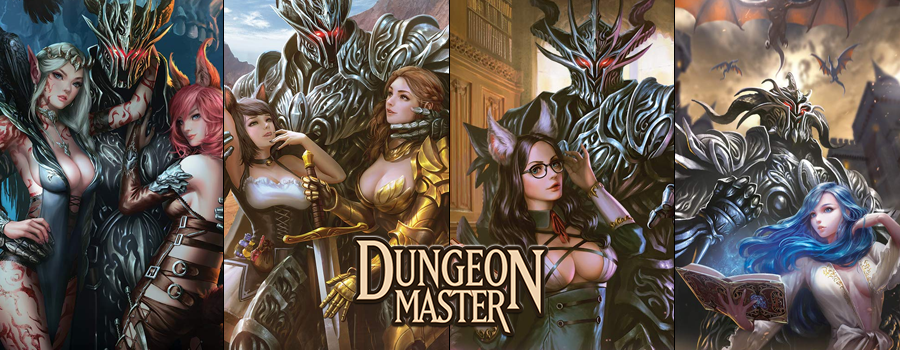
Decend is a series that starts out about a group of one hundred people with a massive gender imbalance in favor of women suddenly waking up with game structured powers on an island where they are required to complete quests in a dungeon in order to obtain the necessities to survive. Pretty standard as far as harem LitRPG stories go. Still, it does a pretty decent job with the character focused stories within that. The protagonist, Jay, is a pretty decent guy that it’s pretty amusing to watch stumble through the various situations he does. The heroines at this point are pretty decent too, each having a reasonably fleshed out character. The actual dungeon diving is decent enough in terms of how the party uses their abilities and deals with the situations in the dungeon, but what makes this part interesting is that the narrative also seems to put an emphasis on focusing the interpersonal conflicts between people in the group and handles it pretty well. In combination, the two result in what feels like pretty good pacing despite the actual progress in the dungeon itself being pretty slow. The biggest issue during this portion I would say is the interludes, which end up describing in detail to the reader the exact circumstances of what is going on and why long before the protagonist or anyone in his party has any idea. It really didn’t feel like this knowledge gap was ever used properly to build up suspense or tension, rather it just seemed to take a lot of mystery out of things and made Jay finally figuring things out completely lack any impact.
The point where Jay finally figured things out, the end of the third book, is also where the series becomes terrible. Even before that, in the third book a shift away from focusing on dungeon diving in favor of essentially mediation and bond based cultivation for stat growth began. It was somewhat interesting at first, but the heavy focus on describing it in overt detail got old quickly and it quickly got pretty boring because the systems are incredibly basic, with all the extra detail just being a rambling word salad that is inconsistent and never has any significance on the plot. The fourth book focused even more on that, in addition focusing more on technological development that’s described in a pretty hand wavy way that uses too many words to say nothing, as well as adding in time control powers that allow a lot more growth to happen in what amounts to a short period of time in the story. It’s also at this point that the cast gets overtly bloated and all the new characters start blurring together as they all lack any major sense of presence or personality and the old cast also starts to behave increasingly inconsistently. Jay felt like he was having a decent character arc in the first three books, but in the fourth and fifth he just acts randomly in a much more generic and flat manner, with the author throwing around phrases in the vein of “the old Jay would have X, Y, Z” to contrast with an action he’s doing to make it seem like he’s grown, but the path from the old Jay to the Jay that’s performing whatever is being highlighted is too nebulous for it to stick. As a result, whatever investment had been built up in the cast over the course of the first three books just bleeds away to nothing by the end of the series.
It is also important to note the shift into a sci-fi like story in the last book. I say sci-fi like, because I feel it’s supposed to be sci-fi but the sci-fi aspect is so terrible that I feel actually calling it sci-fi is giving the series too much credit. There had been some sci-fi elements throughout, which had seemed interesting when they were mostly just hints, but when the narrative actually started using them in full it became clear the author has no idea at all how to do so because it’s just nonsense that just keeps dragging on and on. The shift is also really abrupt and kind of dumb. At the end of the fourth book, they’re still fighting standard dungeon enemies mostly. The first half of the fifth book is just a really long description of using time powers and cultivation abilities to push through decades of growth. However, spending all this time is a complete waste, because in the battles that follow very little of it matters. It feels like the book was actively trying to waste the reader’s time with the first half of the book, which is especially egregious because the final battles are all half assed, rushed, and unbelievably lame. The final villain straight up says, and I quote, “YOUR PUNY MIND CANNOT FATHOM THE DEPTHS OF MY INTELLECT. I ATTEMPTED TO REASON WITH YOU. NOW DIE.” And yes, it was in all caps in the book too. The epilogue is pretty weak too, with nothing surprising or interesting in the least, just basically being exactly what you’d expect without any particular details or description that stood out or made it satisfying at all.
As for general notes, the writing in general was really amateurish. The prose in general lacked flow and the dialogue was pretty stiff. The random throwing in of references also wasn’t handled all that well. There was a Japanese character named Meikiyo that was especially cringe worthily bad. The cover art was pretty good in the first three books, but strangely enough despite having a similar art style to the point I think it’s the same artist, the fourth and fifth books’ covers look pretty bad.
A decent dungeon diving LitRPG start that descends into terribly written sci-fi so bad that the whole series is not really worth reading.
6/10








